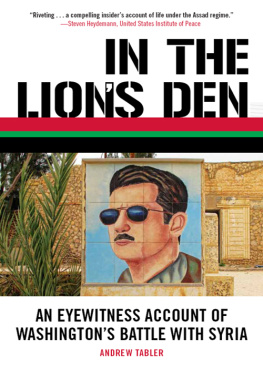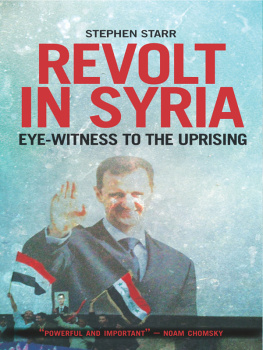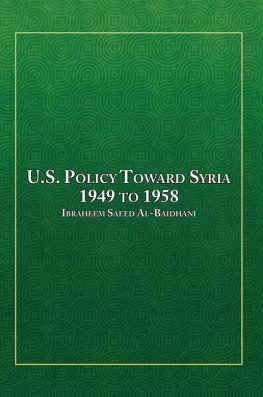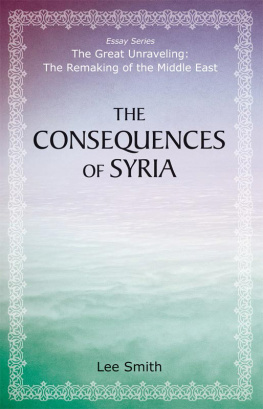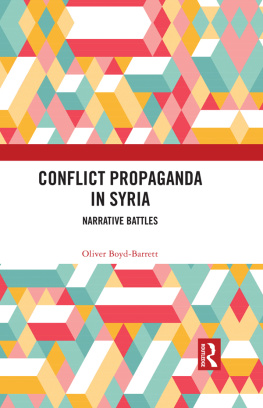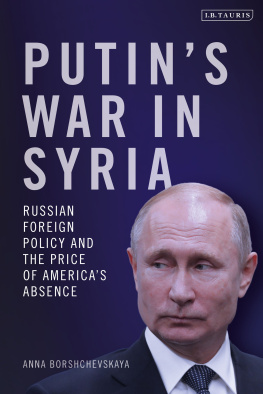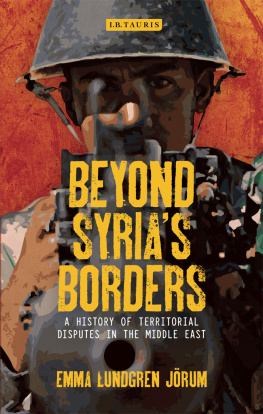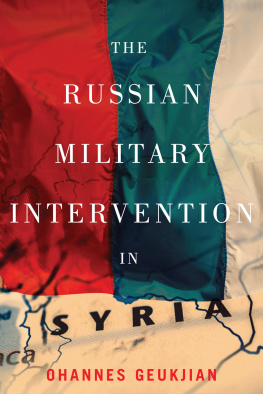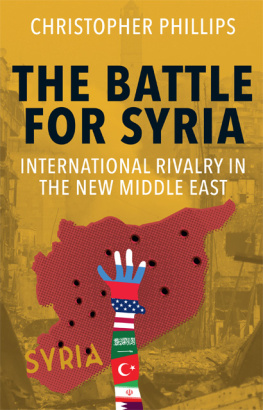

Library of Congress Cataloging-in-Publication Data
Tabler, Andrew.
In the lions den : an eyewitness account of Washingtons battle with Syria / Andrew Tabler. 1st ed.
p. cm.
Includes bibliographical references and index.
ISBN 978-1-56976-843-3 (pbk.)
1. United StatesForeign relationsSyria. 2. SyriaForeign relationsUnited States. 3. Bush, George W. (George Walker), 1946- 4. Assad, Bashar, 1965- 5. Tabler, Andrew. I. Title.
E183.8.S95T33 2011
327.7305691dc23
2011024015
Cover and interior design: Jonathan Hahn
Cover photo: Phil Smith
Map design: Chris Erichsen
Copyright 2011 by Andrew Tabler
All rights reserved
First edition
Published by Lawrence Hill Books
An imprint of Chicago Review Press, Incorporated
814 North Franklin Street
Chicago, Illinois 60610
ISBN 978-1-56976-843-3
Printed in the United States of America
5 4 3 2 1
For my parents, Clarence and Lucille; my brother, Bill; and my grandmother Helen, whose unconditional love made my long journeys possible.
You have retired to your island, with, as you think, all the data about us and our lives. No doubt you are bringing us to judgment on paper in the manner of writers. I wish I could see the result. It must fall far short of truth: I mean such truths as I could tell you about us alleven perhaps about yourself.
Lawrence Durrell,Balthazar
CONTENTS
ACKNOWLEDGMENTS
I would not have been able to tell this story without the help of friends and institutions that encouraged me to write about my experiences in Syria and Lebanon. A good portion of this book was essentially written while I was a fellow with the Institute of Current World Affairs (ICWA). My fellowship, which began only days before the former Lebanese prime minister Rafik Hariri was assassinated, allowed me to travel and write for over two years as I followed my nosein the ICWA traditionaround Syria and Lebanon. Special thanks go to Joseph Battat, a former ICWA fellow in China who noticed me while on a mission for the World Bank in Syria and encouraged me to apply to the institute. ICWA executive director Steven Butler, as well as his predecessor, Peter Martin, helped me learn to put myself back into my writing after years of writing and editing dry news. Completing that process was Victoria Rowan, the New Yorkbased writing coach and editor. Through my work with Victoria, I learned a lot about storytelling and how to manage myself through the writing process. I also learned how dilemmas not only define characters but American and Syrian presidents as well.
I could not have endured my sojourn in Syria and Lebanon without the friendship of Michael Karam and Nicholas Blanford, two outstanding Beirut-based writers whose kindness helped me deal with the stress of living in Syria. During our weekly gatherings in Beirut, Mike and Nick, together with friends Norbert Schiller, Anissa Rifai, and Mona Alama, helped me put my experiences in perspective. As did Lee Smith, a good friend and great writer who then called Beirut home. Last but not least, I would like to thank Andrew Lee Butters, my flatmate in Beirut, who helped keep me mentally and physically fit, and Katherine Zoepf, my flatmate in Damascus, who treated me with good food and even better stories.
A number of Syrians made a lasting impact on my stay in Damascus. Special thanks go out to Kinda Kanbar, businessman Abdul Ghani Attar, Abdul Kader Husrieh of Ernst & Young Syria, Ibrahim Hamidi of Al Hayat newspaper, and Ayman Abdel Nour of all4Syria, as well as to Francesca De Chatel, a wonderful writer and editor who ultimately succeeded me as editor in chief of Syria Today. Because of the Syrian regimes current crackdown, I would like to collectively thank all those at Syria Today for all you taught me and allowed me to teach you. I would also like to recognize the diplomats of the US embassy in Damascus who spent considerable time helping me understand Syria and US-Syria policy, including Daniel Rubinstein, Mary Brett Rogers-Springs, Chris Stevens, Steven ODowd, Brian ORourke, Todd Holmstrom, Andrew Abell, Maria Olson, Katherine Van De Vate, Pamela Mills, and Tim and Tracy Pounds.
After I left Syria, the Washington Institute for Near East Policy provided me with a platform in Washington to write about the country. Special thanks go to Robert Satloff, Patrick Clawson, David Makovsky, David Schenker, Simon Henderson, Matt Levitt, Dina Guirguis, Michael Jacobson, Michael Singh, Mike Eisenstadt, Steve Borko, and Larisa Baste, whose input on my work has helped me expand from journalism into policy research. Thanks also go to Kathy Gockel and the Stanley Foundation, who first helped get my ideas into Washington policy circles, and Foreign Policys David Kenner.
My biggest appreciation goes to those who took the time to read and comment on the books draft. They include Andrew Abell, Syria desk officer, US Department of State; Itamar Rabinovich, former Israeli Ambassador to the United States and former representative in peace talks with Syria; and Levant experts Amr al-Azm, Jon Alterman, Nicholas Blanford, Steven Heydemann, and David Schenker. I would also like to thank my friends in government who have shared their thoughts with me about the Levant, including the State Departments Ruth Citrin and Matt Irwin and the National Security Councils director for Lebanon and Syria, Hagar Hajjar. Thanks also go to Susan Betz and Kelly Wilson of Lawrence Hill Books, who edited the manuscript, and Mary Kravenas and Meaghan Miller, who aided me in the books promotion. Last but not least, I thank my fantastic research assistant, Andrew Engel, and my intern, Maya Gebeily. Together their comments and hard work made this a much better book.

INTRODUCTION
I only planned to work in Damascus for a few months and engage an Arab country I didnt know. Instead, I stayed seven years and got an unexpected front-row seat to a fight.
This book is a firsthand account of the confrontation between the administration of US president George W. Bush and the regime of Syrian president Bashar al Assad. The Bush administration called its Syria policy isolation, while the Assad regime portrayed it as an American plot to overthrow Syrias leadership and remake the Middle East in Americas image.
No attempt will be made in this book to argue either way, as details of decision makers plans and intentions have yet to emerge. (Britains former prime minister Tony Blair writes in his book, A Journey: My Political Life, that Bush and former vice president Dick Cheney had machinations to remake the Middle East, using hard power to take down the regimes in Iraq, Iran, and Syria. While certain members of the Bush administration may have advocated using military force against Syria, I have been unable to find any formal US government plans to bring down the Assad regime.) Nevertheless, much of this story is part of the United States invasion and occupation of IraqAmericas largest-ever military adventure in the Middle East.
I saw the conflict between Washington and Damascuswhich I generally refer to as a cold warfrom an unusual and privileged vantage point. I lived and worked in Damascus between 2001 and 2008, served as a media adviser for nongovernmental organizations (NGOs) under the patronage of President Assads wife, Asma, and had the honor to cofound Syrias firstand still bestEnglish-language magazine,
Next page
